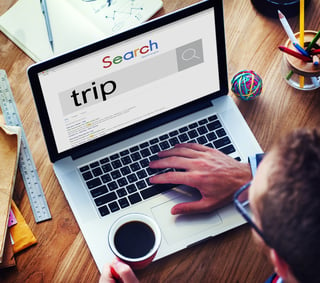 The next time you’re at your local supermarket, take a moment and look around at the checkout lines. Sure, you’ll see your standard POS set-up, cashiers, and baggers, but what you’ll probably also notice a handful of self-serve check-out lanes where shoppers have the capability to scan, bag, and pay for their items without the assistance of a store employee.
The next time you’re at your local supermarket, take a moment and look around at the checkout lines. Sure, you’ll see your standard POS set-up, cashiers, and baggers, but what you’ll probably also notice a handful of self-serve check-out lanes where shoppers have the capability to scan, bag, and pay for their items without the assistance of a store employee.
These kiosks have seen a huge growth in popularity during the last few years - particularly in large chain retailers like Walmart, Target, and others - for the speed, efficiency, and convenience they offer consumers in the ability to customize and control their shopping experience from the moment they enter the store to the moment they exit.
From the retailer’s POV, these self-serve kiosks are a value-added proposition in that they reduce instances of human error; significantly decrease personnel costs; enhance customer satisfaction; and allow for retailers to refocus their efforts on the products and services they provide by eliminating a human resource touch point.
What does the self-checkout station at your neighborhood supermarket have to do with the travel industry?
Well, these self-serve checkouts are the perfect analogy for how digital technology has altered the landscape of the travel industry to create a more customer-centered experience where travelers themselves have the power to control how, when, and in what way they make travel plans.

Because digital technology has lowered the bar to entry for today’s travelers, gone are the days of communication and information silos created between tourism websites, OTAs, brick and mortar travel agencies, and tour operators. Today’s travelers, much like the shopper at your local market, can move seamlessly from shopping to purchasing at their own pace.
With all this in mind, here are 3 ways in which digital technology is changing the travel industry.
Personalization
Digital technologies such as Big Data, cloud computing, and soon even cognitive computing have made it easy for travel companies to personalize offerings and packages based on consumer preference, thus creating a customized consumer experience that will resonate with customers and help drive return business. For example, a travel company can target a millennial traveler by using actionable, mined preference data to provide said traveler with unique, eclectic travel options without forcing the millennial traveler to wade through returned searches of packaged destinations, cruises, or other travel options of little interest.
Not only does this provide our millennial traveler with peace of mind in that he or she feels the travel company is well-aligned with their interests and desires, it allows the travel company to gather additional data and preferences about the destinations and services our millennial traveler seeks which can be leveraged into additional opportunities in the future via promotions, special offers or discounts, and packages.
While it’s true today’s traveler is more savvy and connected when it comes to researching and booking trips or vacations, the sheer volume of available information can be overwhelming. Personalization via digital technology gives travel companies a leg-up on providing a quick and convenient purchasing experience.
Becoming Social
Today’s average traveler lives increasing more in a virtual and online environment. Social media websites like Facebook, Twitter, and Instagram, along with travel review websites, have changed the way travelers research, interact, and recommend destinations to friends, family, and other social media users. Travel companies have been somewhat slow in embracing social media and user-generated content as a way of interacting with customers and creating relationships that endure after the traveler has returned home and unpacked their suitcase, though the industry at-large has played a lot of catch-up in utilizing social media to increase customer engagement.
But social media, review sites, and other user-based content are also changing the way travel companies create, manage, and provide products and services. For example, say a hotel offers several rooms with more luxurious bath and personal hygiene products than are found in their more standard rooms. If online reviews, recommendations, or social media posts about these higher-end products are more frequent and more positive, management can leverage this response into reevaluating the products offered hotel-wide and decide whether to alter their standard products accordingly.
Going Mobile
Recent studies show today’s traveler is spending more and more time connected to their mobile device, both in their personal and professional lives. And these mobile devices run the gamut from smartphones to tablets to combinations or integrations thereof. With so many travelers researching, purchasing, and reviewing travel destinations via their mobile devices, responsiveness and agility in a travel company’s website and overall online presence is key - travel companies without such responsive design capabilities not only run the risk of losing potential customers due to technology issues, but they can also severely damage their image if travelers don’t believe the company is playing by the rules of today’s game when it comes to functional technology.
This ‘mobile disruption’ is also requiring travel companies to reevaluate how they fully optimize their mobile strategy. Integrating booking and payment functionality into mobile design schemes that can function across a wide variety of platforms is now a top priority for travel companies to remain competitive in an increasingly digitized industry. Mobile technology has enabled travelers to book hotels or flights, order room service, or review a guided wine tour and tasting via handheld devices in their pockets, and this control and enhanced visibility is a boon to today’s traveler and an opportunity for growth and expansion for today’s travel companies.
Why should you invest in travel technology?
This is a question every manager in the travel industry should be asking themselves, because the thought process behind a serious answer will jumpstart – or clarify – a reasoned foundation for a strategic role and direction for technology.
















